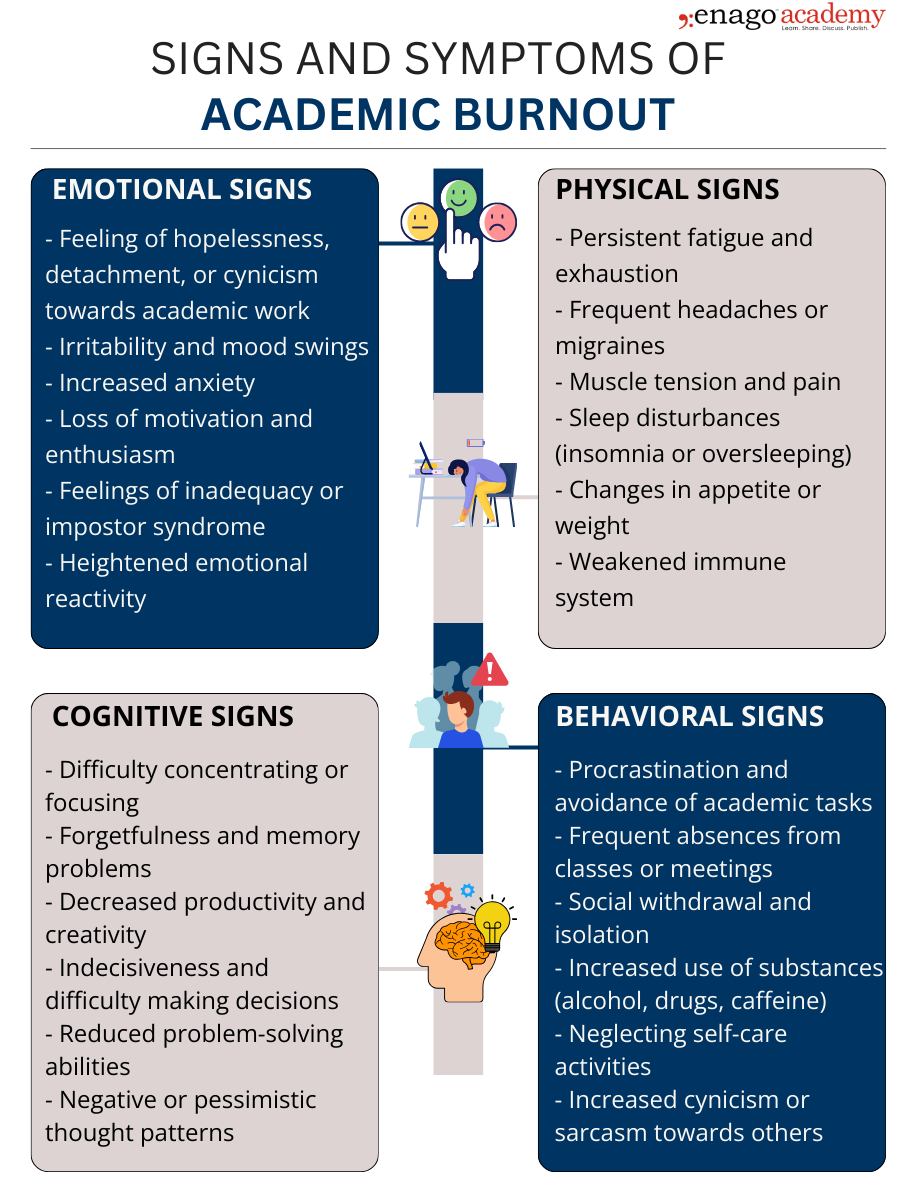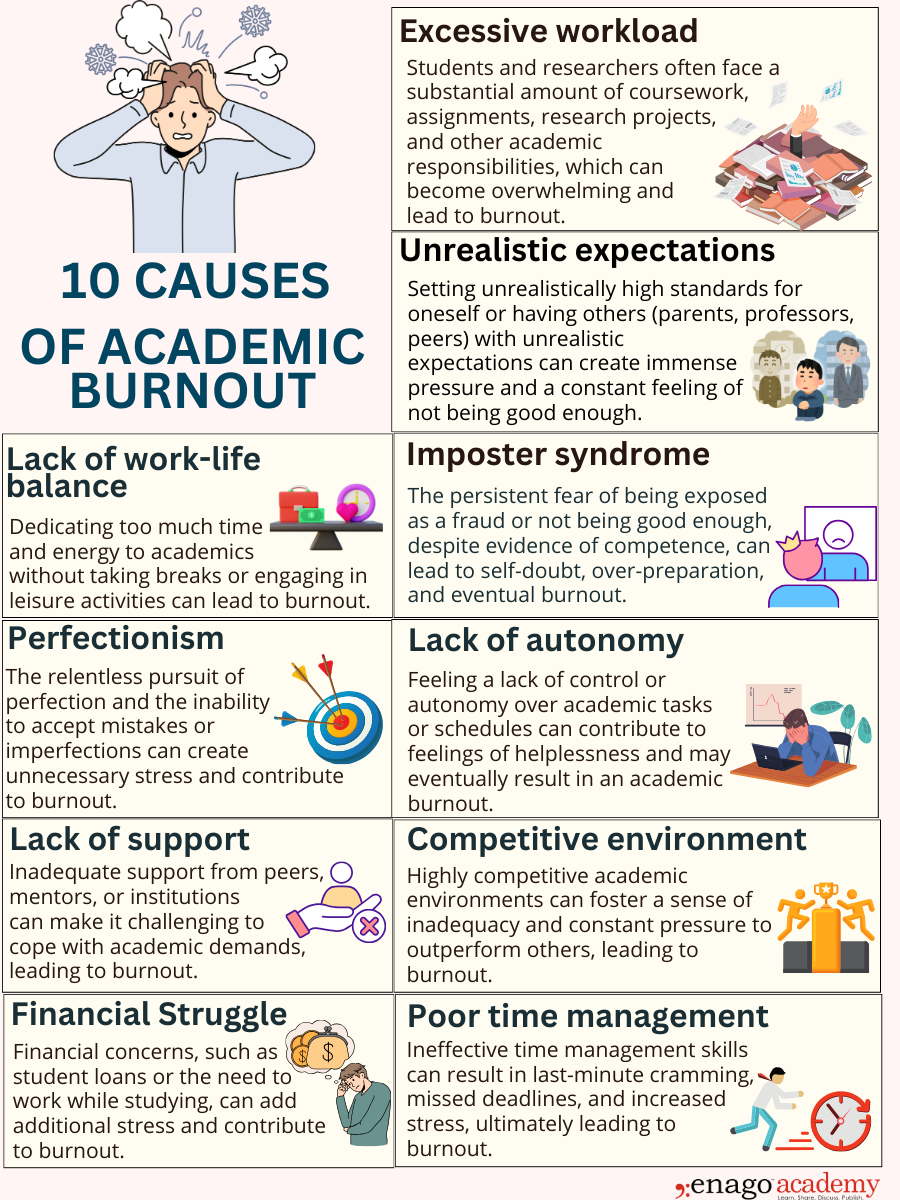Recognizing the signs: A guide to overcoming academic burnout

As the sun set over the campus, casting long shadows through the library windows, Alex found herself staring blankly at her laptop screen. Trapped in the whirlwind of deadlines, assignments, and mounting pressure, the words on her research paper seemed to blur together, and a sense of exhaustion weighed heavily on her shoulders. Although she had her to-do list sorted, performing any of those tasks seemed overwhelming to her. “Too much to do!” she thought. She was tired, anxious, and found it difficult to focus on any of the tasks. Her vibrant energy was replaced by a dull haze of exhaustion and self-doubt. She sat blank, struggling to understand what she was feeling.
Does it sound like you on certain days? This could be a case of academic burnout.
What is Academic Burnout
Academic burnout, a growing concern among students and researchers worldwide is more than exhaustion. It is generally the culmination of working on a same project or assignment, or doing the same task over a long period of time. It usually happens when your academic and personal life seems overwhelming and difficult to cope with. Burnout is a state of physical, emotional, and mental exhaustion.
As Alex read what academic burnout was, she pondered upon the importance of mental well-being. She realized, good student life wasn’t just about high grades or research progressing well; but also included good mental health.
Identifying Academic Burnout
Academic burnout can be difficult to recognize. The impact of a burnout can be far-reaching, affecting not only academic performance but also overall well-being. Recognizing the signs early in oneself as well as your close ones is crucial, as it allows timely intervention and support. The signs and symptoms of academic burnout can vary from person to person, but they generally fall into four categories: physical, emotional, cognitive, and behavioral.
 It’s important to note that individuals may experience a combination of these signs and symptoms, and their manifestations can vary in severity and duration. It’s essential to be attuned to these signals, not only in oneself but also in peers, as burnout can often go unnoticed or be mistaken for mere stress. Recognizing these signs early is crucial for seeking appropriate support and implementing coping strategies to prevent burnout from worsening.
It’s important to note that individuals may experience a combination of these signs and symptoms, and their manifestations can vary in severity and duration. It’s essential to be attuned to these signals, not only in oneself but also in peers, as burnout can often go unnoticed or be mistaken for mere stress. Recognizing these signs early is crucial for seeking appropriate support and implementing coping strategies to prevent burnout from worsening.
While stress and burnout share some similarities, they are distinct phenomena. Stress is a temporary response to a specific event or pressure, while burnout is a chronic state of emotional, physical, and mental overwhelm or exhaustion resulting from chronic stress. Recognizing this distinction is crucial in seeking appropriate support and interventions.
Causes of a Burnout
Understanding the causes of a burnout is important to understand the root of the issue in order to avoid it. Here are some common causes of academic burnout.
 It’s important to recognize these potential causes and take proactive steps to address them, such as seeking support, managing time effectively, and practicing self-care to prevent or overcome academic burnout.
It’s important to recognize these potential causes and take proactive steps to address them, such as seeking support, managing time effectively, and practicing self-care to prevent or overcome academic burnout.
Coping Academic Burnout
While academic burnout can be challenging to overcome, there are ways to cope and prevent its onset. Instant relief methods may include practicing mindfulness, engaging in physical exercise, or seeking support from friends, family, or a counselor. Building a strong support network and prioritizing self-care can go a long way in mitigating the effects of burnout.
Here are some ways to cope with academic burnout:
1. Take Adequate Breaks:
Stepping away from your work for short periods can help you recharge and regain focus. Take a walk, listen to music, or engage in a relaxing activity you enjoy.
2. Practice Self-care:
Make time for activities that promote physical and mental well-being, such as exercise, meditation, or engaging in a hobby you find fulfilling.
3. Seek Support:
Don’t hesitate to reach out to friends, family, or a counselor for emotional support. Sharing your struggles can help alleviate feelings of isolation and provide a new perspective.
4. Prioritize and Delegate:
Evaluate your workload and prioritize tasks based on their importance and deadlines. Don’t be afraid to delegate or ask for help when necessary.
5. Improve Time Management:
Develop effective time management strategies, such as creating a schedule, using a planner, or breaking larger tasks into smaller, more manageable steps.
6. Practice Mindfulness:
Mindfulness techniques, such as deep breathing exercises or meditation, can help you stay present, reduce stress, and improve overall well-being.
7. Celebrate Small Accomplishments:
Recognize when your expectations are unrealistic and learn to accept that perfection is often unattainable. Celebrate small accomplishments and focus on progress rather than perfection.
8. Get Enough Sleep:
Lack of sleep can exacerbate burnout symptoms. Establish a consistent sleep routine and create an environment conducive to quality rest.
9. Seek Professional Help:
If burnout persists or leads to severe anxiety or depression, don’t hesitate to seek professional help from a counselor, therapist, or mental health professional.
10. Take a Break:
In severe cases, it may be necessary to take a temporary break from academic responsibilities to prioritize self-care and recovery.
Remember, coping with burnout is an ongoing process, and different strategies may work better for different individuals. Be patient, compassionate with yourself, and don’t hesitate to seek support when needed.
Here are some strategies to prevent burnout: Institutions play a crucial role in addressing academic burnout. Educators and mentors should foster a more student-friendly environment by promoting open communication, providing accessible mental health resources, and encouraging a healthy work-life balance. Additionally, incorporating stress management and resilience-building programs into the curriculum can equip students with the necessary tools to navigate the challenges of academic life.
Institutions play a crucial role in addressing academic burnout. Educators and mentors should foster a more student-friendly environment by promoting open communication, providing accessible mental health resources, and encouraging a healthy work-life balance. Additionally, incorporating stress management and resilience-building programs into the curriculum can equip students with the necessary tools to navigate the challenges of academic life.
As Alex’s journey through academic burnout unfolded, she realized that seeking help was not a sign of weakness but a testament to her strength and resilience. With the support of her peers, mentors, and institutional resources, she learned to prioritize her well-being, embrace a growth mindset, and find joy in the pursuit of knowledge once again.
Remember, academic burnout is a common challenge, but it is not insurmountable. By recognizing the signs, seeking support, and implementing effective coping strategies, students and researchers can emerge stronger, more resilient, and better equipped to pursue their dreams without sacrificing their well-being.
Frequently Asked Questions
Academic burnout often involves feeling emotionally drained, exhausted, and detached from your studies, while stress is a temporary feeling of pressure. Burnout can lead to a lack of motivation and decreased performance, whereas stress may still allow you to function at a reasonable level. Furthermore, burnout is a persistent feeling that doesn't go away with breaks, while stress tends to alleviate with relaxation and self-care. Physical symptoms like headaches, insomnia, or changes in appetite can be more pronounced in burnout compared to stress.
No, academic burnout is not a sign of weakness or failure. It's a common reaction to prolonged stress and overwhelming academic demands. Recognizing and addressing burnout is a proactive step towards self-care and maintaining well-being.
Here are some positive outcomes of overcoming academic burnout:
1. Regaining enthusiasm and motivation for learning and studying.
2. Improved focus and concentration on academic tasks.
3. Better time management and organization skills.
4. Enhanced overall mental and physical well-being.
5. Increased resilience and ability to cope with future challenges.
6. Improved academic performance and outcomes.
7. Stronger sense of self-awareness and self-care habits.
Recovery from academic burnout varies for each individual and depends on the severity of burnout, support systems, and self-care practices. It can take anywhere from a few weeks to several months or longer. Consistent efforts towards self-care, seeking support from peers or professionals, and making changes to reduce stressors can help in the recovery process.









